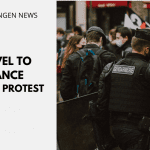Travel Warning: Travel To France In January 2023
After widespread travel disruption caused by strikes last year, more industrial action is set to take place across Europe in 2023.
Last week, on the 19 January, there was a mass strike action across France causing a halt in flights and trains.
French workers took industrial action in protest of their government’s proposed plan to increase the country’s retirement age from 62 to 64 which means workers would have to wait for two more years before receiving their pension if the bill passes in Parliament.
Protests in major French cities, including Paris, Marseille, Toulouse, Nantes, and Nice, brought many transport services to a standstill, and the Eiffel Tower was closed to visitors.
Eight of the biggest unions, which all took part in the industrial action, have called for another day of action on 31 January.
The UK Foreign Office has now updated its guidance ahead of any further strikes.
“Planned industrial action in the UK and France in January may lead to delays or changes to scheduled travel within France and to/from the UK. Please consult your travel operator for the latest updates.”
“Demonstrations can take place in France, often in major cities. If demonstrations do turn violent, a heavy police/gendarmerie presence is to be expected. In all cases, you should avoid demonstrations wherever possible and follow the advice of the local authorities.”
UK Foreign Office
Entry To France From The UK
After Brexit, there are new entry requirements for British passport holders.
British travellers should ensure that their passport has been issued in the past 10 years at the time of entry to France, and it must be valid for at least three months on the date that you leave France.
France is part of the Schengen area, so British holidaymakers can travel and stay for up to 90 days in any 180-day period without a visa.
There are no Covid entry requirements for France, but if you catch it while in the country, there are a number of hoops you'll be asked to jump through.
If you are fully vaccinated and test positive you must self-isolate for seven days from the day on which you first develop symptoms or seven days from the date of the positive test result. If you’re unvaccinated or partially vaccinated, you must self-isolate for 10 days.
What are your thoughts on this issue? Talk to us in the comment section below. Or if you need more advice on the above, contact us for further travel & immigration advice.
Check out the deals we have found below and tell us your travel plans.
Check out the offers and discounts from:
And because of the pandemic, don’t forget to get your travel insurance, which will cover you for flight disruptions and pandemic related matters.
IaM can help with your visa application to Europe, the United States, the UK & other countries
If you need help with a US visa, a UK Visa, or a visa to Europe, including help with appointment booking obligations, IaM can help. For more information and advice on US immigration, UK immigration law and US visa applications or if you need any help or assistance please, reach out to your Visa Coordinator at IaM.
Some of our posts include affiliate links. If you choose to purchase any of these products, we might get a small commission. For more information, check out our TOS.
- Spain Extends Citizenship by Descent Law Until 2025 - 18 July 2024
- Venice To Double Entry Fee in 2025 - 17 July 2024
- New Irish Visa Requirements for Citizens of South Africa and Botswana - 15 July 2024









